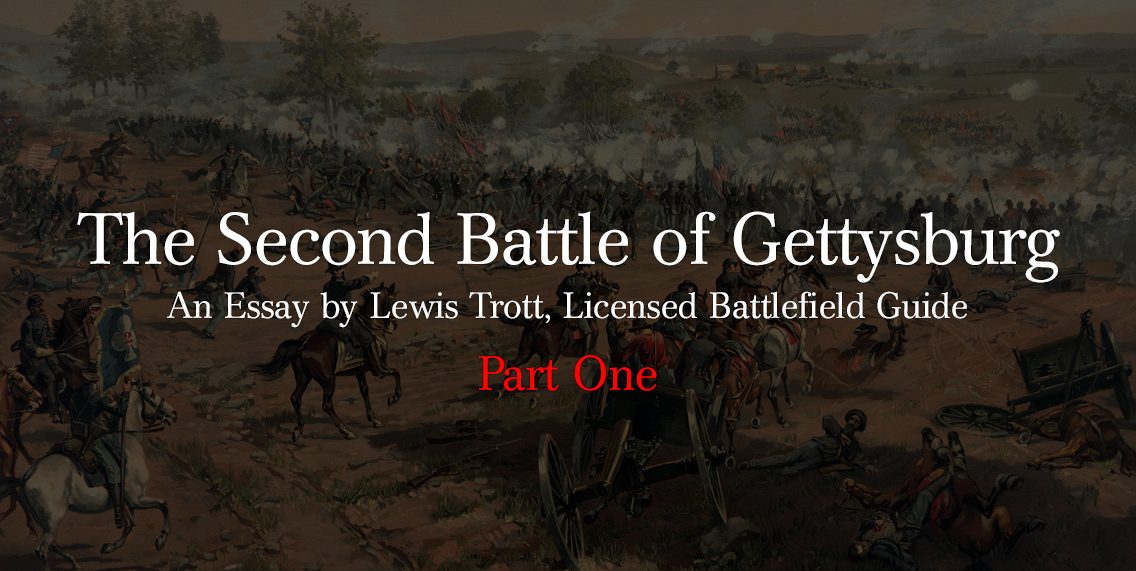
16 Mar The Second Battle of Gettysburg, Part One
By Lewis Trott, Licensed Battlefield Guide, Gettysburg National Military Park
Although he could not have known it at the time, at approximately 4:00 on the afternoon of July 3, 1863 Major General George Meade reached the zenith of his career as commander of the Army of the Potomac (AOP). This army under his leadership had done what no other Union force had been able to accomplish in the preceding year, and that was to soundly defeat the Amy of Northern Virginia under General Robert E. Lee. But unbeknownst to George Meade the seeds of criticism were being planted as defeated Confederates made their way back towards their lines along Seminary Ridge and the greenhouse that would help those seeds grow was the Joint Committee on the Conduct of War.
The Committee on the Conduct of War was made up of seven members, three Senators and four members of the House of Representatives. During the 38th Congress of 1864 the principal committee members were the Chairman of the Committee Sen. Benjamin Wade of Ohio, a Radical Republican and vehement anti-slavery man. Serving alongside Wade was another radical Republican Sen. Zachariah Chandler from Michigan. Sen. Benjamin Harding of Oregon was a Democrat on the Committee who was elected to fill the seat left vacant by the untimely death of Sen. Edward Baker at Ball’s Buff. From the House were Republican Representatives Daniel Gooch from Massachusetts, George Julian from Indiana and Benjamin Loan from Missouri, along with Democrat Moses Odell from New York.
When the hearing convened on February 26, 1864 (the Committee of the 38th Congress first convened in January 1864 with a focus on Maj. General Joseph Hooker during his tenure as commander of the AOP), the topic was The Army of the Potomac under Maj. General Meade and why that army had not been able to bring Robert E. Lee’s army to submission. While students of the Battle of Gettysburg know that the conduct of Maj. General Meade as head of the AOP during the Gettysburg Campaign formed the heart of the hearings at this time, this topic was not explored in a vacuum as the hearings began with questions regarding the Battle of Chancellorsville and continued through what became known as the Mine Run Campaign. However the performance of Meade during his first weeks of command will be the primary focus of this essay.
During that portion of the hearings now commonly known as the “Meade Hearings” the committee focused in on a few core questions. The fact that the battle was fought at Gettysburg was a topic for consideration in that the committee received enough early testimony to insinuate that General Meade never wanted to fight at Gettysburg, even after the first shots were fired on July 1, 1863. In a “what did he know and when did he know it” manner, before it was ever a catch phrase, the committee wanted to know why no substantial force was pushed forward after the repulse of the Confederates on the afternoon of July 3, 1863 and at what point did General Meade know they were indeed retreating? And finally why did the AOP not attack the Army of Northern Virginia vigorously before General Lee was able to retreat into Virginia on July 14, 1863.
Remarkably, after only three witnesses had testified, two fully and one only partially, Senators Wade and Chandler drafted a letter and delivered it to President Lincoln requesting the President to remove Maj. General Meade from command. The committee had it entered into the record that the two Senators sought an audience with the President and Secretary of War in order to transmit the testimony taken up to that point which in their view clearly showed the “incompetency of the general in command of the army” and they subsequently demanded that Maj. General Meade be removed from command and “the appointment of someone more competent to command”. Their choice for replacement? Major General Joseph Hooker, but of course if the President had someone better in mind, they would be agreeable to anyone more competent than the current commander.
_________________________________________________________________
1 https://www.senate.gov/artandhistory/history/common/investigations/JointCommittee_ConductofWar.htm
2 Report of the Joint Committee on the Conduct of the War at the Second Session Thirty-Eighth Congress. Washington: Government Printing Office,1865, Page XIX.
No Comments